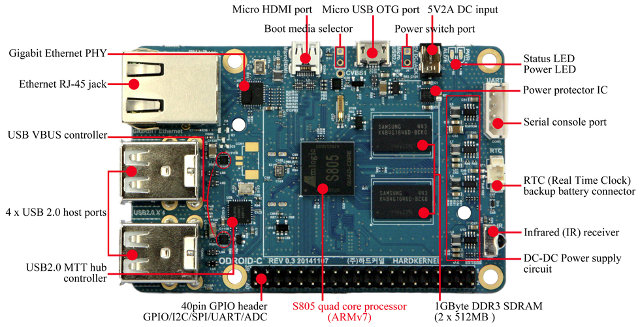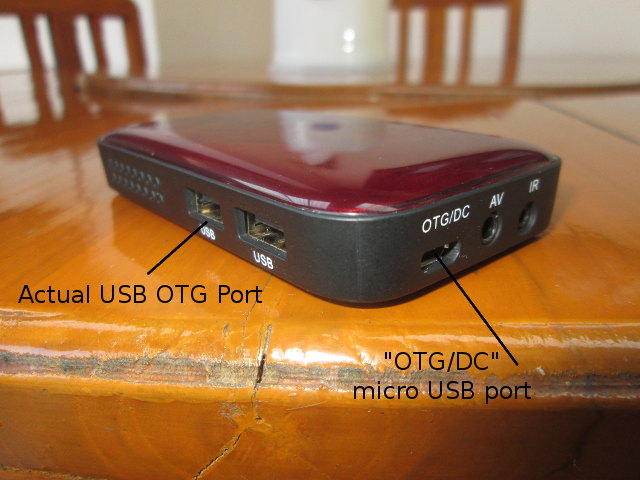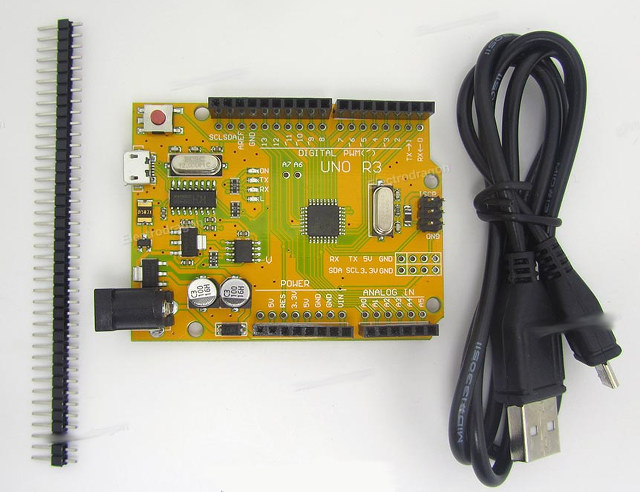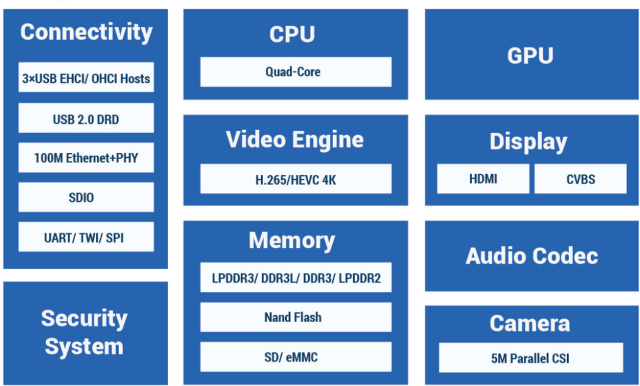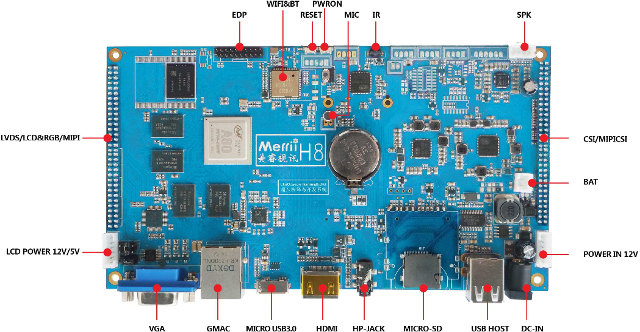Amlogic S805 is a quad core Cortex A5 processor which has found it way into low cost devices such as MK808B Plus TV Stick which can be purchased for as low as $30, or full-sized TV box such as MXQ S85 or MINIX NEO X6. All this low cost devices are nice, but the full source code is not available in your want to adapt them to your need. Luckily, Amlogic releases both an Android SDK, and a buildroot for Linux with GPU and Video Processing Unit (VPU) support, so Hardkernel decided to go ahead, designed a board, and has just launched ODROID-C1 quad core development board for just $35, or the exact price of a Raspberry Pi Model B+, but with much greater specs. ODROID-C1 specifications: SoC- Amlogic S805 quad core Cortex-A5 processor with a Mali-450MP2 GPU (2x fragment cores + 2x vertex shader cores) System Memory – 1GB […]
How To Upgrade Firmware on Ugoos UM3 mini PC
Ugoos released two new dual boot Android / Ubuntu images for Ugoos UT3 and UM3, which reduces the size of the system by 300MB, includes LibreOffice, replaces Firefox by Chromium + PepperFlash plugin, and fixes various bugs: ut3_dualboot_v0.2.rar – For UT3 full sized TV box UM3_dualboot_v0.2.rar – For UM3 mini TV box The firmware update procedure for Rockchip RK3288 is well-known, and Ugoos even includes a word file with flashing instructions in Microsoft Windows with the firmware images. However, it still took me about one hour to find out how to do with Ugoos UM3, so I thought I’d write a post in case others encounter the same issue. I flash the firmware in Ubuntu, so instead of using Android Tool, I flashed it with upgrade_tool command line utility I got from Orion R28 SDK, but you can also download Linux_Upgrade_Tool_v1.2.tar.gz directly. First let’s enter recovery mode. The procedure is […]
Kairos T-Band is a Smart Watchband for Your “Dumb” Watch (Crowdfunding)
Kairos introduced a high-end mechanical smartwatch with a semi-transparent OLED display a few months ago. They’ve now launched an Indiegogo campaign to sell several models for $500 to $1,000+, but they’ve also introduced T-Band, a smart watchband with an integrated display that you can fit to your existing (mechanical) watch, in order to receive notifications, answer phone calls, get directions, and even start your car. There are three models of smartband all running Kairos OS on an ARM Cortex M4 MCU @ 168 MHz with Bluetooth Classic / Low Energy: T-Band ND (No Display) Alerts user of notifications via a vibrator and LED indicator, and tracks fitness / sleep, as well as health data. Sensors – 9-axis gyroscope, accelerometer, compass, optical sensor, and GSR (Galvanic Skin Sensor) which detects skin temperature and sweat. Audio – Digital MEMS MIC for text to speech capabilities (requires 3rd party app) Battery – 200 mAh […]
Polaroid Socialmatic Android Camera Prints Photos on The Go
Polaroid used to make instant cameras allowing you could take a picture, and print it immediately. As digital photography became more and more popular, this type of cameras mostly disappeared, but Polaroid is giving it another go with Socialmatic camera running Android, that can print regular pictures and even selfies thanks to its rear and frontal cameras, using its embedded ZINK Zero Ink printer. Polaroid Socialmatic specifications: SoC – Unnamed ARM processor System Memory – N/A Storage – 4GB Internal Storage + micro SD card slot Cameras – 14MP frontal camera with LED flash, 2MP rear camera Display – 4.5″ Touchscreen LCD with Mood Assistant A.I. Audio – Stereo Speakers Connectivity – GPS, WiFi and Bluetooth Remote Printing Capabilities, 2″x3″ Zink Instant Filters USB – Micro USB port for charging and file transfer? Battery – Rechargeable lithium-ion battery Dimensions – 13.2 cm x 13.2 cm x 3.0 cm Since the […]
Arduino UNO R3 Clones Now Cost Less than $5
An original Arduino UNO R3 costs about nearly $25, and I remember clones would cost about $10 on Aliexpress, but today I’ve been informed about VISduino, an Arduino UNO R3 clone, with some cost optimizations such as cheaper components and connectors, which sells for just 15.50 CNY (~$2.50 US) on Taobao, and $4.90 on Electrodragon. But double checking on Aliexpress, I could find another popular Arduino UNO R3 clone for $4.58 including shipping, but no USB cable. Both boards cut costs by replacing ATmega16U2 by CH340 USB to serial chip, and replacing the ATMEGA328P-PU MCU (DIP) by an SMT version of the Atmel MCU such as ATMEGA328P-AU (QFP). Other changes on VISduino include: Replaced USB B-type connector by a micro USB port Added extra through holes side-by-side with the Arduino headers for easier debugging. Extra 2×4 pin holes with TX, RX, VCC, GND, and I2C pins You may have to install […]
Hisilicon Hi3798M Quad Core Android TV Box with USB 3.0, and 4K / HEVC Support Sells for $53
I’ve been informed about a quad core Cortex A7 TV box supporting 2160p output, H.265 codec and featuring a USB 3.0 port, that’s currently selling for just $52.99 on Aliexpress including shipping, as well as Ebay for $62 from the same seller. Only “quad core ARM cortex A7” was listed in the specs, and the exact processor was not mentioned, but I could see marketing material about “Q3 quad core” used, and a quick search redirected me to Himedia Q3 Quad Core also powered by an Hisilicon processor, but a different device. So I decided to contact the seller (“Buyforsure”) who quickly replied it was indeed powered by Hisilicon Hi3798M processor. The model is called BFS 4KH on Aliexpress/Ebay, but that name has probably been made up by the seller, so it will also be found under other name. Nevertheless here are the specifications of this low cost 4K TV […]
Allwinner H3 is a Quad Core SoC for Sub $50 4K H.265 Media Players
Allwinner launched their H-series processors (Homlet) for home entertainment with Allwinner H8 octa-core processor, supporting HEVC up to 1080p, which will find its way into media players selling between $50 and $80. The company has now added Allwinner H3 quad core processor, selling for just $6, which will be available in $35 to $50 OTT TV box later this month, and include support for 4K UHD H.265/HEVC video playback. Key features of Allwinner H3: CPU – Quad core Cortex A7 GPU – Mali-400MP2 up to 600 MHz Memory I/F LPDDR2, LPDDR3, DDR3, DDR3L SDRAM 8-bit SLC, MLC, TLC, EF NAND with 64-bit ECC SD, eMMC, tSD, fSD, and efSD Video Decoding – H.265/HEVC and H.264 up to 4K@30 fps, H.264 BP/MP/HP, VP8, MPEG1/2, MPEG4 SP/ASP GMC, H.263 including Sorenson Spark, WM9/VC1, JPEG/MJEPG up to 1080p60 Encoding – H.264 up to 1080p30 Video Output – HDMI with HDCP, CEC, 3D function, […]
Merrii A80 Hummingbird Octa-core Development Board Supports HDMI, VGA, and eDP Video Outputs
Up to now at least three boards based on Allwinner A80 processor were available: A80 OptimusBoard by Merrii, pCDuino8 by Linksprite, and Cubieboard4 by Cubitech, and the first two boards are basically the same. Merrii has now introduced a new board which they call “A80 Hummingbird H8”, with more features and ports including HDMI, VGA and eDP video outputs, LVDS / MIPI DSI display interfaces, MIPI CSI camera interface, an RTC with battery and more. Merri H8 specifications: SoC – AllWinner A80 octa-core processor with 4x Cortex 15, 4x Cortex A7 cores in big.LITTLE configuration with Imagination Technologies PowerVR GC6230 GPU compliant with OpenGL ES 3.0/2.0/11, OpenCL 1.1, and DirectX 9.3 System Memory – 2GB DDR3 Storage – 8GB internal storage (Sandisk SDIN7DU2 iNAND Flash), micro SD slot up to 32 GB Video Output/ Display Interfaces HDMI 1.4 up to 4K UHD resolution VGA port eDP v1.2 up to 2560×1600 @ […]


